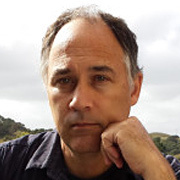
Ian Wishart
Journalist Ian Wishart has twice been listed on The Listener’s Top 50 NZ power list; in 2007 the magazine described him as “the country’s most influential journalist”. The born-again Christian is never far from the headlines, and has also been labelled as a conspiracy theorist and “professional controversialist” (said Michele Hewitson in The NZ Herald).
Over four decades Wishart has written more than a dozen books, published by his company Howling at the Moon. These include controversial examinations of Kiwi crime cases, many of them high profile disappearances and deaths (Arthur Allan Thomas, the Kahui twins, Ben Hope and Olivia Smart). He’s weighed in on everything from the Treaty of Waitangi (The Great Divide) to God (The Divinity Code), Helen Clark (Absolute Power), climate change (Air Con) and the decline of Western civilisation (Eve’s Bite).
Educated at Onslow College, Wishart passed a Wellington Polytechnic journalism course in 1982. At Radio Windy he covered chemical spills and hostage dramas, and developed a reputation as an ambulance-chasing go-getter with a zeal for probing what was behind a story. Stints followed at Radio Hauraki, Radio Pacific, and as news director of 89FM.
Wishart was lured in front of the cameras to report for the new third channel in 1989, where he filed stories for 3 News and Nightline. He is one of the reporters seen on TV3's very first prime time bulletin, on 27 November 1989. While working for TV3, Wishart began investigating claims raised by NZ First leader Winston Peters about high level corporate fraud. Peters had been in contact with used computer dealer Paul Little who had been mistakenly sold a box (the now-notorious ‘wine box’) of floppy discs. They contained files alluding to offshore tax avoidance schemes, linked to leading NZ corporate and political figures. Wishart identified key transactions that substantiated Peter’s allegations. In 1992 White was killed in a mysterious car crash.
According to Wishart’s book The Paradise Conspiracy he was pressured by his superiors at TV3 to drop the investigation. In 1993 he was head-hunted across to TVNZ, where he worked on current affairs shows Frontline and Eyewitness (which he co-fronted with Alison Mau). He continued to work on the Winebox files as part of a special TVNZ investigation, with Frontline journalist Michael Wilson and producers Carol Hirshfield and Mark Champion. It was internally dubbed ‘Project X’.
Under court injunction, TVNZ management stopped the programme going to air in December 1993. In response Wishart leaked details of the the programme to news media, and parted ways with TVNZ in the wake. Eventually the Frontline documentary aired as two-hour primetime broadcast in June 1994.
It was met with acclaim. In 2005 an NZ Herald profile credited Wishart’s presentation with “bringing big business tax dodges to the masses in an understandable format.” Independent managing editor Jenni McManus, who also helped break the Winebox story, later called the Frontline documentary "a stunning piece of work". She said that "without him it would have remained an arcane piece of tax interpretation”. The revelations forced a Royal Commission of Inquiry, which initially exonerated the accused. NZ’s highest court later overturned the inquiry’s findings and found the transactions were prima facie fraudulent.
Wishart published three Winebox books: The Paradise Conspiracy, The Vintage Winebox Guide, and The Paradise Conspiracy 2. After leaving TVNZ he covered the inquiry for National Business Review and The Evening Post. Parts of Paradise Conspiracy inspired 2004 Geoff Murphy feature film Spooked, starring Cliff Curtis. In a 2003 episode of Secret New Zealand, Wishart was interviewed by Peter Elliott regarding the car crash that killed White.
In 1997 Wishart hosted Real TV, Touchdown’s ‘found footage’ reality series which compiled accidents and disasters, from ski accidents to drug busts. NZ Herald critic Greg Dixon suggested Wishart might “like to jump off a building himself.” Wishart wrote to Dixon, graciously thanking him for the rare pleasure of being “savaged with wit."
In 1999 he founded Investigate magazine, covering current affairs from a Christian editorial point of view. His staunchly-expressed beliefs led to Wishart featuring less regularly in mainstream news publications, but his publishing of belligerently anti-PC articles has seen him becoming news himself: for example a 2005 interview in which John Tamihere said he was sick of hearing about The Holocaust and bemoaned the appointment of female colleagues (which he labelled “front-bums”), and a 2013 piece where columnist Richard Prosser described young Muslim males as “misogynist troglodytes from 'Wogistan'”.
Wishart hosted talk shows on Radio Pacific from 2000 to 2004, and in 2005 co-hosted an NZOne special on Christian channel Shine TV about the Treaty of Waitangi. In 2014 he launched online podcast Talking Matters.
He hit the headlines again in 2016 when he published Elementary - The Explosive File on Scott Watson and the Disappearance of Ben and Olivia, in which he reversed his initial opinion on the 1998 case. True to form, the contents were hot to handle: the book was temporarily pulled from the shelves by Whitcoulls after the bookstore was threatened with a lawsuit from fellow investigator Keith Hunter, who has also reported on the case.
Sources include
Investigate website. Accessed 2 February 2016
David Fisher, 'New book claims: Forget the denials, Scott Watson definitely killed Olivia Hope and Ben Smart, but cops did contort evidence’ - The NZ Herald, 29 January 2016
David Fisher, Jonathan Dow, Jonathan Milne, 'Tamihere 'sick' of Holocaust' - The NZ Herald, 10 April 2005
Michele Hewitson, ‘Michele Hewitson Interview: Ian Wishart’ - The NZ Herald, 23 February 2013
Catherine Masters, Greg Dixon, ‘Reporter who became news’ (Interview) - The NZ Herald, 15 April 2005